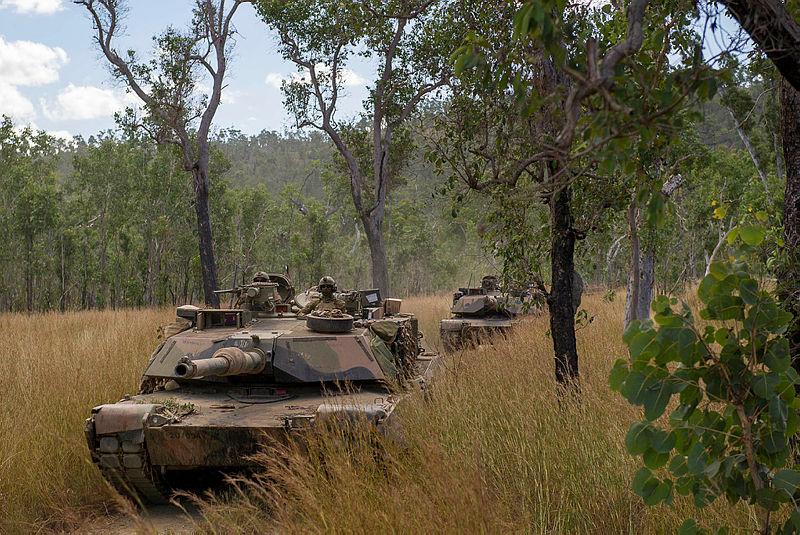
It’s been 12 months since former major general and senator Jim Molan locked horns with ASPI’s Marcus Hellyer in the Strategist over armoured fighting vehicles (AFVs). Both put some great arguments forward, and the matter has rested there since.
However, recent discussions with Depfence Department officials indicate that the Australian Army 1st Brigade’s LAND 400 phase 3 vehicles are likely to skip Darwin for Adelaide so that they can be used year-round warrant a return to the issue.
In an August 2018 article in The Australian, Hellyer suggested that AFVs might be ‘ill-suited to tasks that feature heavily in modern counterinsurgency operations, such as route clearance and patrolling’, and highlighted their vulnerabilities on the conventional battlefield. He made a strong case that AFVs may be ‘poor value for the likely tasks the ADF will have to perform in the future’.
Later, Molan argued that AFVs have proven their worth, in terms of both winning conflicts and saving soldiers’ lives, through hard-earned experience on the battlefield.
These arguments are particularly relevant now as two contenders will soon be shortlisted for the army’s new infantry fighting vehicles (IFVs).
In 2011, the army released Plan Beersheeba, which sought to create three combined-arms multi-role combat brigades. Each brigade was to comprise two infantry battalions and an armoured cavalry regiment, ‘with organic armoured, cavalry and mounted combat lift capabilities along with the usual supporting element of artillery, signals, combat engineers and combat service support units’.
The army is more cognisant than ever that even in low-threat environments, non-state actors like insurgent groups and terrorists have the technology to seriously threaten Australia’s current armoured capabilities.
The LAND 400 program will provide the Australian Army with the means to reshape and reorganise its combat formation. The army is acquiring new IFVs to improve safety and minimise casualties across all conflict scenarios, while simultaneously providing increased firepower to operate in concert with tanks in offensive operations.
Former defence minister Marise Payne opened a request for tender for phase 3 of the LAND 400 program in August last year. The $10–15 billion project aims to replace the army’s ageing M113 armoured personnel carriers with a fleet of up to 450 state-of-the-art IFVs and 17 manoeuvre support vehicles.
The tender sought vehicles with high levels of protection, mobility and lethality. It also required the vehicle to be tracked, have the capability to carry a section of eight soldiers, and be able to engage in combined arms manoeuvres with Australia’s M1 Abrams tanks.
Three brigades will be equipped with vehicles from phases 2 and 3 of LAND 400. But rumour has it that 1st Brigade’s IFVs will likely be based in South Australia, where they can avoid Darwin’s wet season and train all year.
Professor Paul Dibb’s 1986 review of defence capabilities highlighted that when it came to Australia’s north, the army needed forces that could move quickly and effectively, with minimum logistical support and some fire support. It’s little wonder, then, that the first capability to be moved north after Dibb’s review was the 2nd Cavalry Regiment, which was soon followed by the mechanised 1st Brigade.
It’s surprising that, three decades later, the unchanged environmental challenge of ‘the wet’ has become a justification for moving whole units and capabilities—such as the tanks of the 1st Armoured Regiment—south to Adelaide.
If wet season factors are driving any plans to divert 1st Brigade’s IFVs to Adelaide from Darwin, it must be asked whether the vehicles themselves are fit for purpose.
As a former soldier, Molan argues convincingly that ‘there can be no sound defence policy or strategy without sound tactics’. At the same time, however, tactics should not be the sole driver of policy and strategy decisions. In this case, it seems that the tactical and administrative challenges of raising, training and maintaining capabilities in northern Australia are driving decisions that run counter to good national strategy.
In today’s increasingly unpredictable strategic environment, we are more likely to find ourselves operating throughout our region than defending our nation from within our own borders. That means the possibility of having to operate our armoured vehicles in the tropics is high. At the very least, the IFVs need to be able to operate across the length and breadth of Australia regardless of the season and the weather. Without that ability they’ll be of neither tactical nor strategic value.
If the army is saying that its IFVs wouldn’t be able to operate in our region for large parts of the year if they were in Darwin, or that they will only be able to be deployed on sealed roads, it’s hard to justify the project’s price tag.